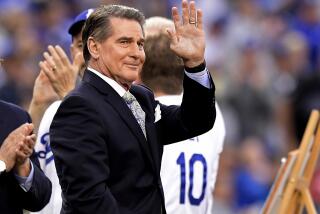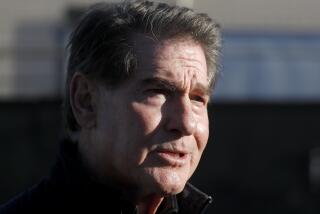Gore’s Bearded, Rested . . . and Ready for ‘04?
- Share via
WASHINGTON — Since conceding the presidential election last December, Al Gore has been traveling, teaching and, above all, keeping his head down. He’s avoided the press, studiously refrained from criticizing President Bush and made only minimal effort to stay in touch with key Democrats.
This week, after an extended summer vacation in Europe, Gore (sporting a beard) edged back into the public eye by hosting a series of political seminars for young people in Tennessee. On Tuesday, officials at the Iowa Democratic Party announced that he would be the keynote speaker at their annual fund-raising dinner next month, an appearance that’s likely to be viewed as his formal return to the political arena.
Even Gore’s closest advisors say the former vice president is genuinely uncertain whether he will seek the White House in 2004. But as he begins to raise his political profile, one thing is certain: If Gore does run for the Democratic nomination again, he will pursue a very different sort of campaign than he did last time, close associates say.
As vice president in 2000, Gore enjoyed nearly unified support from all of the key institutions in the Democratic Party--from organized labor to top elected officials to the leading fund-raisers. But with many of those insiders disillusioned by Gore’s performance in 2000, his supporters say, he should not expect to count on those advantages again.
Instead, key Gore advisors expect that he would have to run more of a “guerrilla” primary campaign in a race where the key institutional forces disperse their support across a crowded field. “I think he knows enough to know that a race in ’04 will be very different,” Carter Eskew, Gore’s top media consultant in the 2000 campaign, said in a television interview last week.
Differing Views on Possible Gore Run
Even at this early date, the prospect of another Gore candidacy is drawing diverse reactions from Democratic elites and the party’s rank-and-file primary voters.
“In terms of enthusiasm, I think there is a very big divide,” says Robert Borosage, co-director of the Campaign for America’s Future, a liberal group close to organized labor. “I think most of the liberal activists, particularly in the white community, are pretty dismayed with Gore as a candidate, and so there’s a lot of resistance to going back. But I think in significant parts of the Democratic Party outside of the activists--in the black community, for example--there is an assumption it was robbed from him and he has a right to run again.”
With less institutional support, not to mention the loss of Air Force Two and the other accouterments of the vice presidency, a Gore 2004 campaign is much less likely to intimidate rivals than the 2000 version, which scared off all contenders except former Sen. Bill Bradley.
But those still supporting Gore say a campaign with less money, fewer endorsements and a less imposing entourage might free him to connect more informally with voters, which he attempted, with only mixed success, in formats like regular town meetings in 2000. It could, some think, even allow him to run as something of an outsider. In a primary field potentially top-heavy with Washington figures such as Senate Majority Leader Tom Daschle of South Dakota, Sens. John F. Kerry of Massachusetts and John Edwards of North Carolina, and House Minority Leader Richard A. Gephardt of Missouri, Gore could be the only contender not holding an elected office.
“Some of the advantages he had he will miss if he runs again,” said one former aide still in close contact with Gore. “But most of the institutional ‘advantages’ he will be glad to have shed, because those are the things that kept him from communicating directly to voters and being thought of as presidential timber in his own right.”
For Gore to win a second nomination against Bush, he will have to swim against the tide of history. In the last 100 years, only three losing nominees have been renominated by their parties four years later: Democrats William Jennings Bryan in 1896 and 1900 and Adlai Stevenson in 1952 and 1956, and Republican Thomas E. Dewey in 1944 and 1948. Each lost their second race as well.
On the other hand, only three men before Gore won the popular vote and still lost the presidency. Two of them, Democrats Andrew Jackson in 1828 and Grover Cleveland in 1892, came back four years later to oust the man who defeated them.
Those around Gore say his profile will increase only gradually this fall. Last Saturday, he hosted a bipartisan seminar on campaigning with former GOP presidential candidate Lamar Alexander at Vanderbilt University in Nashville. This week he is sponsoring a training seminar for young Democratic political workers who will be dispatched to party campaigns in states such as New Jersey and Virginia, which are holding gubernatorial elections this year.
Besides the Iowa appearance, Gore has agreed to campaign for Jim McGreevey, the Democratic gubernatorial candidate in New Jersey, and has committed, in general terms, to appearing for other Democratic candidates in the 2002 elections. Later this fall, he’s also planning to launch a new political action committee to contribute to party candidates, a common maneuver among potential presidential contenders.
Democratic Voters Still Show Interest
But Gore’s schedule suggests he will mostly be keeping his head down in the months ahead. He is scheduled to teach courses this fall at two Tennessee universities on using family-centered policies to revive troubled communities, the same subject he is exploring through an academic consortium at UCLA. And he is expected to devote much of his time to completing a book with his wife, Tipper, on American families that is due at the publisher next spring.
Even with his low profile, recent polls suggest a substantial reservoir of interest in Gore among Democratic voters. In a CNN/USA Today/Gallup Poll last week, nearly two-thirds of Democrats said they wanted Gore to run again in 2004. When Democrats were asked who they might support, Gore didn’t fare as well, with only one-third picking him. But that number may have been artificially suppressed by the pollsters’ inclusion of Sen. Hillary Rodham Clinton (D-N.Y.), who has already said she won’t run. Clinton drew a substantial amount of African American support in the survey that probably otherwise would have flowed to Gore. More telling, none of the other potential candidates attracted more than Bradley’s 12%.
Hypothetical Matchup Reveals Similar Split
Probably the best news for Gore in the survey was the finding that in a hypothetical 2004 matchup, Americans again split evenly between him and Bush; nearly 90% of Democrats said they would back Gore against Bush again. Gore’s supporters are touting those numbers against Democratic skeptics who feel that if Gore couldn’t win with all the advantages he enjoyed in 2000, he’s unlikely to get over the hump in 2004.
“The strength of his potential primary candidacy is in the head-to-head numbers with Bush today,” said Monica Dixon, Gore’s former vice presidential chief of staff.
Gore’s position with Democratic Party leaders, however, doesn’t appear nearly as strong. For all the talk of being liberated by an erosion in institutional support, Gore faces the probability that many of the practical advantages he enjoyed against Bradley in 2000 would disperse more evenly among the field next time.
One former Gore aide in close contact with Democratic congressional leaders acknowledged that another Gore campaign would enjoy much less support from Democrats on Capitol Hill, who feel he should have won in the first place: “I don’t think that there are going to be people up there that demand he run again,” the aide said dryly.
Organized labor, which provided Gore a critical boost when the AFL-CIO endorsed his candidacy in October 1999, doesn’t appear quite as alienated. But most Democratic observers believe the AFL-CIO is unlikely to unify behind Gore again, especially if he is challenged by Gephardt, who is more skeptical of free trade and more popular with the major industrial unions. If both Gore and Gephardt run, senior labor officials believe it would be extremely difficult for either to win the two-thirds support required for a unified AFL-CIO endorsement.
The best Gore might be able to hope for is the kind of split that Bill Clinton managed in 1992, when he faced resistance from the auto workers and other blue-collar unions but was able to attract offsetting support from big service-sector unions representing teachers and government employees. “Among our members, I think Gore would present a formidable candidacy,” said Sandra Feldman, president of the American Federation of Teachers. “There are other people they might like, but he would certainly have a leg up within the union itself.”
Tensions May Remain Between Gore, Clinton
Then there is Gore’s strained relationship with former President Clinton.
The 2000 race opened a rift between the two men, with Gore blaming Clinton’s affair with Monica S. Lewinsky for many of his campaign troubles, and Clinton complaining that Gore had downplayed the administration’s successes. John Podesta, Clinton’s former chief of staff, says the remaining tension is “one way. It is Gore, and to some extent Gore’s advisors; even Gore’s lightened up about it a little bit. But I don’t think it goes back in the other direction [from Clinton] at all.”
Given that, it’s extremely unlikely Clinton would actively oppose Gore if he runs again. But many in both camps believe the former president could remain neutral in the 2004 race. That might provide a subtle boost to others like Edwards, who has already sought Clinton’s advice on campaign organization in about half a dozen phone conversations and meetings.
“If Clinton would say: ‘It’s not appropriate for me to take a side in the nominating process’ . . . that’s a pretty cold shoulder, I think,” said one senior strategist in Gore’s 2000 campaign. “And if that happens--beginning with the African American community, which will be looking for strong signals from Clinton--that could have real impact.”
More to Read
Get the L.A. Times Politics newsletter
Deeply reported insights into legislation, politics and policy from Sacramento, Washington and beyond. In your inbox twice per week.
You may occasionally receive promotional content from the Los Angeles Times.








